When Hsieh Hsiao-man (謝小曼) decided to leave the corporate world, she went back home — literally. She is the owner of Hsiao Man (小慢), a teahouse, restaurant and clothing store that operates in her childhood home near National Taiwan Normal University (國立臺灣師範大學, also known as Shida, 師大).
Though Hsiao Man is just steps away from the bustling Shida night market (師大夜市), the quiet space seems like it is a world apart. Located on the ground floor of an apartment building, the exterior of the teahouse is lined with a slate tile overhang; a short stone path leads up to a wooden door hidden by small trees and flowering shrubs. The only way passersby can tell Hsiao Man is a place of business is an unobtrusive wooden sign and tiny table with a small batch of name cards.
“My guests always tell me that they walked by Hsiao Man for years without even realizing we are here,” says Hsieh, adding that most of her customers find out about the teahouse through word of mouth.
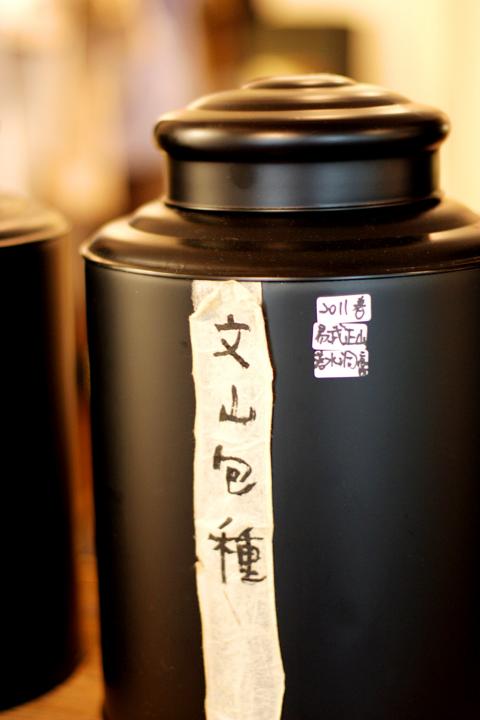
Photo: Catherine Shu, Taipei Times
Opened in 2007, the teahouse’s name is a play on Hsieh’s given name and literally means “little slow.” The building was constructed about 40 years ago and Hsiao Man’s stone floors and wooden beams are original. Its interior is furnished with a mixture of antique pieces and tables custom-built from recycled wood. Aside from a few lamps that cast a warm glow, most of the light filters in from large wood-framed windows.
“I want to create a place where guests can come in, experience a relaxed, slower-paced atmosphere and have to a chance to breathe,” Hsieh says.
Before opening Hsiao Man, she spent seven years in Japan, where she studied fashion design and worked in marketing and research at Seibu Department Store. After returning to Taipei, Hsieh was employed at a bank when she attended a gathering of tea enthusiasts. Seventy-eight booths were set up, each featuring a different type of tea and decorated to reflect the host’s personal aesthetic.
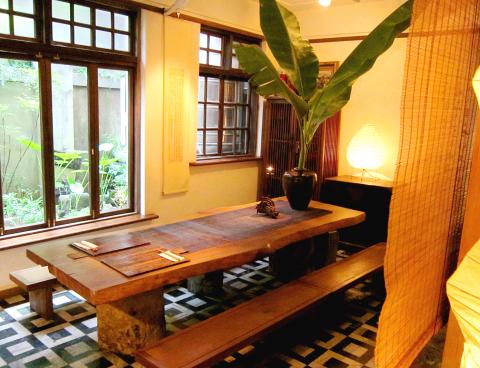
Photo: Catherine Shu, Taipei Times
“That event had a huge influence on me,” says Hsieh. “I found out that tea could not only be good to drink, but also beautiful and quiet at the same time.”
To Hsieh, sharing tea with friends and taking the time to enjoy its subtle aroma are small acts that represent a larger attitude toward life.
“It’s about wabi-sabi,” says Hsieh, referring to a Japanese term that means focusing on the beauty in imperfection. “It’s about simplicity. I want to use tea as a way to create an experience and a lifestyle.”
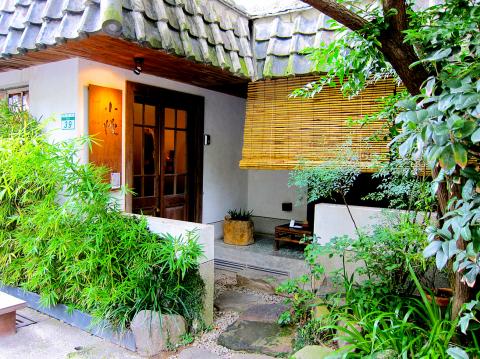
Photo: Catherine Shu, Taipei Times
On a recent visit, Hsieh and a friend brewed high mountain tea (高山茶) in a small ceramic pot and served it in tiny porcelain cups, each of which held only two or three sips. Each pot usually produces five rounds of tea and guests are encouraged to note the difference in flavor as the steeping time increases. The material the teapot is made out of, the quantity of leaves and the temperature of the water also influence the taste and aroma of the beverage.
Most tea served in Hsiao Man is brewed from leaves grown in Taiwan. Hsieh visits areas known for tea production like Lishan (梨山), Alishan (阿里山) and Lugu Township (鹿谷) in Nantou County, where she buys leaves from farmers who grow tea in small quantities using traditional seeding, harvesting and preparation methods.
Hsiao Man also offers lunch and dinner based on Japanese-style home cooking and made with seasonal ingredients. The space recently began carrying linen and cotton clothing by Jikonka and handmade sterling silver and brass jewelry by O2O2; both brands are run by designers Hsieh met during return visits to Japan.
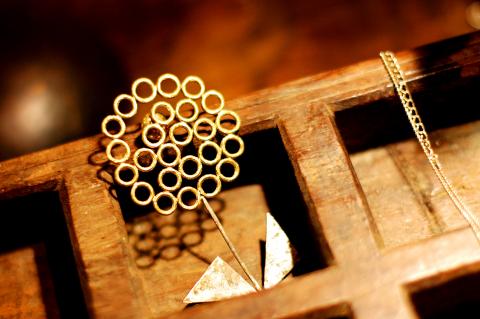
Photo: Catherine Shu, Taipei Times
“I wanted to pick things that would match the atmosphere I am trying to create in Hsiao Man, which is peaceful and comfortable,” Hsieh says.
Despite Hsiao Man’s focus on a “slow life,” Hsieh’s daily routine is quite frantic. She is the mother of two teenagers and Hsiao Man has a tiny staff, so Hsieh is involved in every aspect of its operation, from preparing meals to serving tea to guests.
“I get up in the morning and cook breakfast for my kids. We serve lunch and dinner at Hsiao Man, so we’re always working and I don’t take a break until I get home and go to sleep,” she says. “Even though I look poised, I’m actually constantly very busy.”
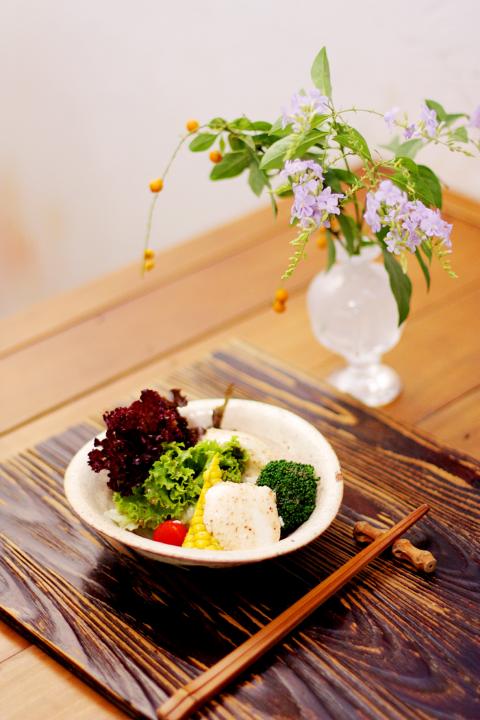
Photo: Catherine Shu, Taipei Times
Hsieh says that sharing tea with friends, however, can be an oasis in a packed schedule.
“Tea is very simple. Drinking and enjoying tea is something that is innate,” Hsieh says. “It’s apart from the outside world.”
Life in the slow lane
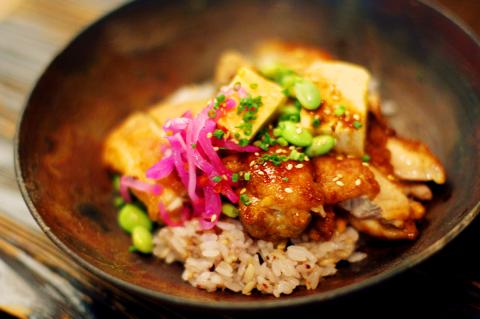
Photo: Catherine Shu, Taipei Times
On the last Wednesday of each month, Hsieh hosts a tea ceremony for up to 15 people. Each three-hour event is about NT$1,000 to NT$1,200 per person and includes lunch. Hsieh introduces aspects of tea preparation and etiquette. A recent gathering focused on what types of leaves are best suited to brewing iced tea. Hsieh also offers hour-long sessions on tea preparation and serving etiquette for individuals or small groups. For more information and to reserve a space, call (02) 2365-0017.
Hsiao Man’s lunch set meals range from NT$400 to NT$600, while dinner is about NT$1,300. Lunch and dinner spots should be reserved three days in advance. For tea drinking, reservations can be made one or two days in advance.
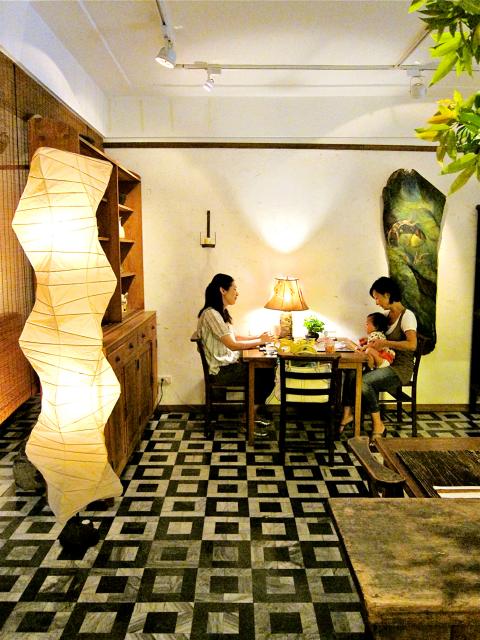
Photo: Catherine Shu, Taipei Times

Three big changes have transformed the landscape of Taiwan’s local patronage factions: Increasing Democratic Progressive Party (DPP) involvement, rising new factions and the Chinese Nationalist Party’s (KMT) significantly weakened control. GREEN FACTIONS It is said that “south of the Zhuoshui River (濁水溪), there is no blue-green divide,” meaning that from Yunlin County south there is no difference between KMT and DPP politicians. This is not always true, but there is more than a grain of truth to it. Traditionally, DPP factions are viewed as national entities, with their primary function to secure plum positions in the party and government. This is not unusual

More than 75 years after the publication of Nineteen Eighty-Four, the Orwellian phrase “Big Brother is watching you” has become so familiar to most of the Taiwanese public that even those who haven’t read the novel recognize it. That phrase has now been given a new look by amateur translator Tsiu Ing-sing (周盈成), who recently completed the first full Taiwanese translation of George Orwell’s dystopian classic. Tsiu — who completed the nearly 160,000-word project in his spare time over four years — said his goal was to “prove it possible” that foreign literature could be rendered in Taiwanese. The translation is part of

The other day, a friend decided to playfully name our individual roles within the group: planner, emotional support, and so on. I was the fault-finder — or, as she put it, “the grumpy teenager” — who points out problems, but doesn’t suggest alternatives. She was only kidding around, but she struck at an insecurity I have: that I’m unacceptably, intolerably negative. My first instinct is to stress-test ideas for potential flaws. This critical tendency serves me well professionally, and feels true to who I am. If I don’t enjoy a film, for example, I don’t swallow my opinion. But I sometimes worry

Mongolian influencer Anudari Daarya looks effortlessly glamorous and carefree in her social media posts — but the classically trained pianist’s road to acceptance as a transgender artist has been anything but easy. She is one of a growing number of Mongolian LGBTQ youth challenging stereotypes and fighting for acceptance through media representation in the socially conservative country. LGBTQ Mongolians often hide their identities from their employers and colleagues for fear of discrimination, with a survey by the non-profit LGBT Centre Mongolia showing that only 20 percent of people felt comfortable coming out at work. Daarya, 25, said she has faced discrimination since she